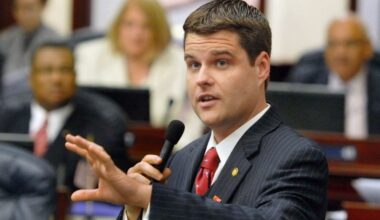The non-partisan National Conference of State Legislatures (NCSL) has voted to adopt a revised policy directive that expresses support for federal marijuana descheduling and cannabis banking reform amid the state-level legalization movement.
The measure, which builds on an existing directive that NCSL passed in 2018, was approved at the organization’s 2022 legislative summit on a voice vote on Wednesday.
Most of the discussion that preceded the vote centered on the need for federal banking reform, a state lawmaker present at the event told Marijuana Moment, but there was no debate over the legalization language. While there was no roll call, the legislator said that opposition was minimal, and he estimated that only about five to seven of the 44 states and territories present seemed to raise their voice against adoption.
NCSL did previously pass a directive calling for cannabis descheduling in 2017, but the most recent measure that was revised this year previously said simply that states should be allowed to set their own cannabis policies without federal intervention. Members of NCSL voted to expand that position to include an explicit call for federal legalization.
The directive was also revised to say that, “until cannabis is federally descheduled,” the executive branch should prioritize enforcement actions against criminal enterprises involved in “illicit” cannabis production and sale, rather than people acting in compliance with state marijuana laws.
SESSION 🚨: Over two-thirds of states and territories regulate cannabis. Hear how state researchers collect and monitor public health data, and how policymakers use it to craft medical and nonmedical adult use policies. #NCSLsummit pic.twitter.com/HxrCbv2nYb
— NCSL (@NCSLorg) August 3, 2022
Another new section that was added to the policy directive pushes Congress to also pass cannabis banking reform.
“Under federal law, cannabis businesses in states that have legalized the sale of cannabis are unable to utilize the country’s banking system, forcing them to operate as primarily cash-only entities,” the directive says. “This reliance on cash makes cannabis businesses prime targets for theft, burglary, armed robbery, and other property crimes. NCSL urges Congress to pass legislation allowing financial institutions to provide banking services to legitimate state authorized cannabis-related businesses.”
Cannabis legalization: We must center the people who were harmed the most by the prohibition of the very thing that we are about to legalize. This must be done in every single policy decision. @ToiHutchinson #NCSL2022
Session: Lessons from 10 Years of Legal Cannabis
— Jheanelle Wilkins (@JheanelleW) August 3, 2022
In 2018, NCSL approved a separate directive that described the unique financial challenges that state cannabis markets are subject to under the status quo of prohibition. The new language is more explicit in its support for congressional action to resolve the problem.
This year’s summit, held in Denver, also involved a NCSL-organized tour of a Colorado cannabis cultivation facility, hosted by the major marijuana company Columbia Care. State lawmakers and legislative staff were invited to participate in the event, but it’s not clear who attended.
Traveling to Colorado this weekend, I had the chance to see how legal marijuana has offered economic development opportunities. I’m excited to talk more about what that could look like here in NC, especially as our tobacco growers look for their place in the 21st century economy.
— Rep. Wesley Harris (@WesleyHarrisNC) August 3, 2022
NCSL additionally hosted a panel on Wednesday that focused on how policymakers use data to develop state cannabis laws. The event featured a representative of the federal Centers for Disease Control and Prevention (CDC), as well as state lawmakers and regulators.
“The policymaking process often provides opportunities to craft rules and regulations addressing common public health and safety concerns and measure data over time,” NCSL said in a summary document. “The early involvement of state and local health officials brings a range of perspectives and expertise into the policymaking process, according to interviews. Early and more recently adopting states have looked to each other for examples of evolving policies and new ideas, creating an ever-changing policy landscape.”
As more states move to legalize cannabis (for medical or recreational use), state lawmakers are addressing cannabis usage while operating a vehicle. Here, @SteveYeagerNV gives a presentation on how states can respond to cannabis DUIs once cannabis has been legalized. pic.twitter.com/1JaxmXy4YR
— NCSL (@NCSLorg) July 31, 2022
“I am thrilled that the NCSL member states voted to adopt the cannabis and federalism directive at the NCSL Annual Summit today,” Nevada Assembly Speaker Pro Tem Steve Yeager (D) told Marijuana Moment on Wednesday. “It is a common sense directive that recognizes that states should be free to choose their own path when it comes to cannabis, without interference from the federal government.”
“In addition, the directive calls for changes in federal law that would allow for robust cannabis research and access to traditional banking, both of which are sorely needed to move the industry forward,” he said.
Meanwhile, in the backdrop of this summit, congressional lawmakers are taking steps to advance legalization and cannabis banking reform.
Senate Majority Leader Chuck Schumer (D-NY) and colleagues filed a much-anticipated bill last month to end federal cannabis prohibition and promote social equity in the industry, for example. It’s similar to legalization legislation that’s passed the House twice now.
Most observers agree that there’s not enough support in the Senate to pass a comprehensive legalization bill with the chamber’s 60-vote threshold this year, but Schumer has been holding high level bicameral and bipartisan talks about potentially moving a package of incremental marijuana reform proposals, including cannabis banking protections.
Up and at ‘em early on this Sunday morning at the @NCSLorg #NCSLSummit to talk about cannabis & Nevada at the Safer Streets, Safer States Preconference. Honored to share the stage with @GrondelT & @SabraRuvera. Also, the giant blue bear was highly interested in the info! #NVLeg pic.twitter.com/CENpQLS7xb
— Steve Yeager (@SteveYeagerNV) July 31, 2022
Schumer said that he’s committed to passing “something” on marijuana reform before the year’s end, and he’s seemingly acknowledged that his legalization legislation may only serve as a jumping off point for a future marijuana omnibus bill of sorts.
The bipartisan Secure and Fair Enforcement (SAFE) Banking Act has passed the House in some form seven times at this point, only to stall in the Senate under both Republican and Democratic control. The House sponsor of that measure, Rep. Ed Perlmutter (D-CO), said recently that he believes the introduction of the Senate legalization bill was the “hurdle” lawmakers needed to overcome to advance his banking legislation.
—
Marijuana Moment is tracking more than 1,500 cannabis, psychedelics and drug policy bills in state legislatures and Congress this year. Patreon supporters pledging at least $25/month get access to our interactive maps, charts and hearing calendar so they don’t miss any developments.![]()
Learn more about our marijuana bill tracker and become a supporter on Patreon to get access.
—
In any case, it seems more likely that the first congressional cannabis reform bill that could move through both chambers and be sent to the president’s desk will focus narrowly on making it easier for researchers to study the risks and benefits of marijuana.
Bipartisan lawmakers in both chambers filed a bill that would accomplish that objective late last month, and it quickly moved through the House. The Senate is expected to take up the proposal in short order before sending it to President Joe Biden, who most expect would sign the incremental proposal.
Relatedly, a bipartisan duo of congressional lawmakers filed a bill last week to set a federal marijuana research agenda and create a designation for universities to carry out cannabis studies with federal grant money.
Like NCSL, an organization representing mayors from across the U.S. adopted a resolution in June, imploring Congress to pass a bill to safeguard banks that work with state-legal marijuana businesses from federal penalties.
The U.S. Conference of Mayors approved the measure during the body’s 90th annual meeting. Last year, the organization adopted a separate measure calling for an end federal cannabis prohibition and promoting social equity in the industry. The latest resolution on banking also expresses support for federal legalization bills, including one that passed the House and the new Senate legislation.
Photo courtesy of Mike Latimer.
Medical Disclaimer:
The information provided in these blog posts is intended for general informational and educational purposes only. It is not a substitute for professional medical advice, diagnosis, or treatment. Always seek the advice of your physician or other qualified healthcare provider with any questions you may have regarding a medical condition. The use of any information provided in these blog posts is solely at your own risk. The authors and the website do not recommend or endorse any specific products, treatments, or procedures mentioned. Reliance on any information in these blog posts is solely at your own discretion.






